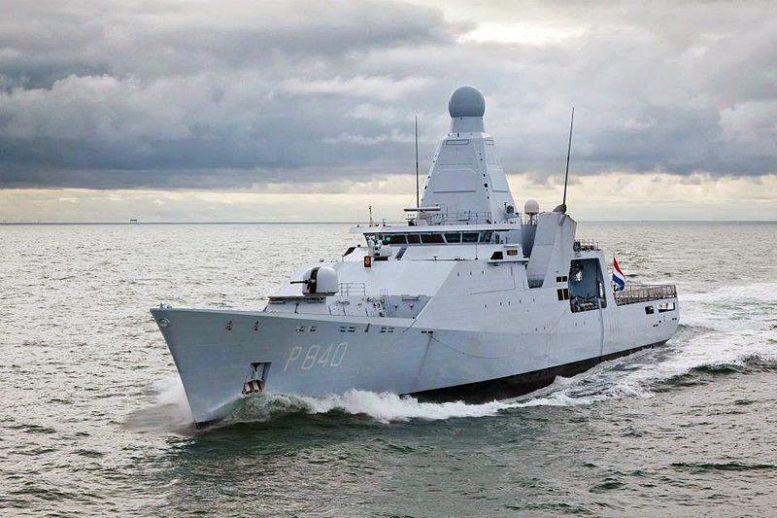The versatile offshore patrol vessel may prove to be a vital solution to the diverse maritime threats in the GCC (Gulf Cooperating Council) Region.
GULF ARAB STATES face significant challenges today, ranging from a slump of oil prices to rising incidents of domestic terrorism. However, the critical need for maritime security is one that is given precedence because of a collective dependence on seaborne trade and transport. If security of these passageways cannot be ensured, the region will be cut off from the rest of the world.
The situation naturally requires a firm response from regional maritime forces – both in terms of strategic planning and in deploying appropriate equipment.
Forming the backbone of new platforms is the Offshore Patrol Vessel (OPV). Boasting speed, versatility and cost-efficiency, the OPV is slowly becoming a preferred alternative to the conventional corvette in many areas of the world that deal with similar maritime concerns.
As such, Gulf nations are considering an increase in OPV acquisition because a flexible platform may be the best way to address a flexible range of threats.
“New capabilities such as patrol vessels and onboard helicopters have already had an effect off the Somali Coast, where the scale of the attacks on commercial vessels has decreased,” explained Captain Mustafa Kanafani, an independent maritime expert and former representative of the League of Arab States to the UN’s International Maritime Organization (IMO).
KEY THREATS
The most prevalent threats facing maritime security within the Arabian Gulf can be categorized into three core issues.
First is political instability. In the event of conflict, adversaries – such as Iran’s Revolutionary Guards Corps – are capable of carrying out sabotage, deploying mines, interfering with shipping, and attacking offshore facilities or maritime traffic that belong to GCC nations.
The second danger is that terrorist groups (some of which are state-sponsored) may hijack ships or use small, fast boats to attack offshore facilities and ports. An unstable Yemen has seen a risk of Houthi-led insurgents developing a capability to close off the Bab el Mandeb, while the expansion and continued presence of ISIL in the Sinai has seen security tighten around the Suez canal. Somali piracy has subsided in recent years but analysts foresee an upswing of activity as multinational naval support withdraws from the region.
Following on from this challenge, there is the issue of security offshore oil and gas platforms, which are intrinsically vulnerable to terrorist attacks but require persistent protection and rapid response.
Overall, the scale and diversity of maritime threats represent a highly complex multi-dimensional challenge for the GCC that looks likely to grow with time.
OPV RESPONSE
In a recent survey undertaken by Defense IQ, an overwhelming majority of naval professionals confirmed that investment into new OPVs, though undeniably a significant expense, is more cost effective and strategically sound than modernizing or adapting current vessels.
Over two thirds (2/3) of respondents also stated that OPVs can be sufficient enough to deal with their current range of combat threats – though countering high-end capabilities still requires the involvement of conventional warships. For those reasons, momentum is steadily building towards new OPV programs in the Arabian Gulf.
The UAE, for example, is currently preparing to receive the second of two newly built Ariala-class multipurpose OPVs from Abu Dhabi Ship Building, with the first vessel having been delivered in February 2017.
The 67-meter Ariala boasts Damen’s sea-axe hull – combining a chined hull and deep V-bottom – that provides very low resistance and vertical acceleration, enabling smooth, high speeds and superior seakeeping. The vessels also provide a comprehensive weapon, sensor and command suite.
Saudi Arabia’s Border Guard has also been undertaking a number of big development projects, including the acquisition of almost 50 fast boats from Germany and supporting electronic systems.
STRATEGIC COOPERATION
Procurement may be seen as a necessary expense when keeping naval and maritime force readiness at their peak but there is also a need to balance this with a constant study of the environment.
“The shipping industry today offers very high-tech fast patrol vessels,” said Admiral Dr Ali Alshualbi (Ret), formerly of the Saudi Arabian Coast Guard, “but the early warning of maritime threats are more important than platforms when it comes to merely responding to them. That requires decisions based on joint risk assessment.“
This is not a case of staying abreast of emergent dangers. There must also be consistent consideration of the opportunities provided by the Partners and Allies.
If it’s in the interest of regional nations to operate cooperatively once new technical systems have been purchased, it’s clear that it is also in their interest to buy cooperatively as well,” said Capt. Kanafani.
This collaborative-customer approach could ensure an essential interoperability and integration of regional systems across surveillance crafts, patrol land stations, and helicopters. While not necessarily complicated, it does require both national and regional policies to be formed.
“At present, cooperation in security across the GCC is limited, but it can be reached if our nations are willing to form a truly joint strategy,” said Dr. Ali.
“Meanwhile, participation of civilian organizations is subject to the standards of IMO regulation and countries must observe that, but integrated management can offer solutions on some important issues,” added Dr. Ali.
These topics shall be discussed among military and government decision-makers, OPV industry professionals, and security organizations in the GCC region at the coming OPV MIDDLE EAST 2017 CONFERENCE in October 2017, to be held in KUWAIT.
This report was developed by the Defence IQ, ahead of the 6th Annual Offshore Patrol Vessels Middle East Conference taking place from 9-11 October 2017 in Kuwait. Officially supported by the Kuwait Naval Force and the Kuwait Ministry of Defence, the event will host 150+ senior naval officers from across the region and further abroad to discuss policy, capability and regional maritime security. For more information, please visit: opvmiddleeast.iqpc.ae
